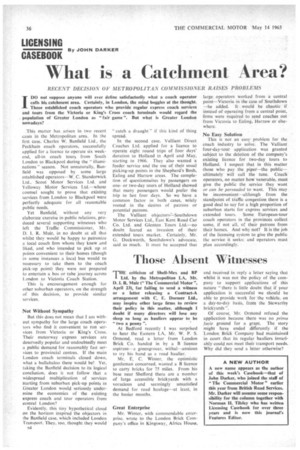LICENSING
Page 38

If you've noticed an error in this article please click here to report it so we can fix it.
CASEBOOK By JOHN DARKER
What is a Catchment Area?
RECENT DECISION OF METROPOLITAN COMMISSIONER RAISES PROBLEMS IDO not suppose anyone will ever define satisfactorily what a coach operator calls his .catchment area. Certainly, in London, She mind boggles at the thought. Those established coach operators who provide regular express coach services and tours from the Victoria or King's Cross coach terminals would regard the , population of Greater London as "fair game ". But what is Greater London nowadays?
This matter has arisen in two recent cases in the Metropolitan area. In the first case, Charles W. Bonfield Ltd., the Peckham coach operators, successfully applied for a licence to operate six weekend, all-in coach tours from South London to Blackpool during the " illuminations" season. Not unnaturally, Bonfield was opposed by some large established operators--W. C. Standerwick Ltd., Scout Motor Services Ltd. and Yelloway MotOr Services Ltd.—whose counsel sought to prove that existing services from London to Blackpool were perfectly adequate for all reasonable public needs.
Yet Banfield, without any very elaborate exercise in public relations, produced several supporting witnesses who left the Traffic Commissioner, Mr. D. 1. R. Muir, in no doubt at all that whilst they would be happy to patronize a local coach firm whom• they knew .and liked, and who intended to pick up at points convenient to their homes (though in some instances a local bus would be necessary to take them to the coach pick-up point) they were not prepared to entertain a bus or tube journey across London to Victoria Coach Station.
This is encouragement enough for other suburban operators, on the strength of this decision, to provide similar services.
Not Without Sympathy
But this does not mean that I am without sympathy for the large coach operators who find it convenient to run services from Victoria • or King's Cross. Their motorway express services are deservedly popular and undoubtedly meet a public demand for reasonably fast services to provincial centres. If the main London coach terminals closed down, what a hullabaloo there would be! Yet, taking the Banfield decision to its logical conclusion, does it not follow that a widespread multiplication of services starting from suburban pick-up pOints in Greater London would seriously undermine the economics of the existing express coach and tour operators from central London?
Evidently, this tiny hypothetical cloud on the horizon inspired the objectors in the Banfield case, which included London Transport. They, too, thought they would "catch a draught if this kind of thing spread.
In the second case, Valliant Direct Coaches Ltd. applied for a licence to operate eight round trips of four days' duration to Holland in April and May, starting in 1966. They also wanted a feeder service and the use of their usual picking-up points in the Shepherd's Bush, Ealing and Harrow areas. The completion of questionnaires by passengers on oneor two-day tours of Holland showed that many passengers would prefer the trip to last four days. So we have a common factor in both cases, solely rooted in the desires of patrons or potential patrons.
The Valliant objectors=-Southdown Motor Services Ltd., East Kent Road Car Co. Ltd. and Glenton Tours Ltd.—no doubt feared an invasion of their extended tours market. Certainly, Mr. G. Duckworth, Southdown's -advocate, said as much. It must he accepted that
large, operators worked from a central point—Victoria in the case of Southdown —he added. It would be chaotic if instead of operating from a central point, firms were required to send coaches out from Victoria to Ealing, Harrow or elsewhere.
No Easy Solution
This is not an easyproblem for the coach industry to solve. The Valliant four-day-tour application was granted subject to the deletion of the company's existing licence for two-day tours to Holland. I suspect that in this matter those who pay the piper—the public— ultimately will call the tune. Coach operators, no matter how venerable, must give the public the service they want or can be persuaded to want. This may be inconvenient—although from the standpoint of traffic congestion there is a good deal to say for a high proportion of suburban starts for express services and extended tours. Some European-tour coach operators in the provinces collect some, if not all, of their patrons from their homes. And why not? 11 is the job of the licensing system to give the public the service it seeks: and operators must plan accordingly.




















































































































